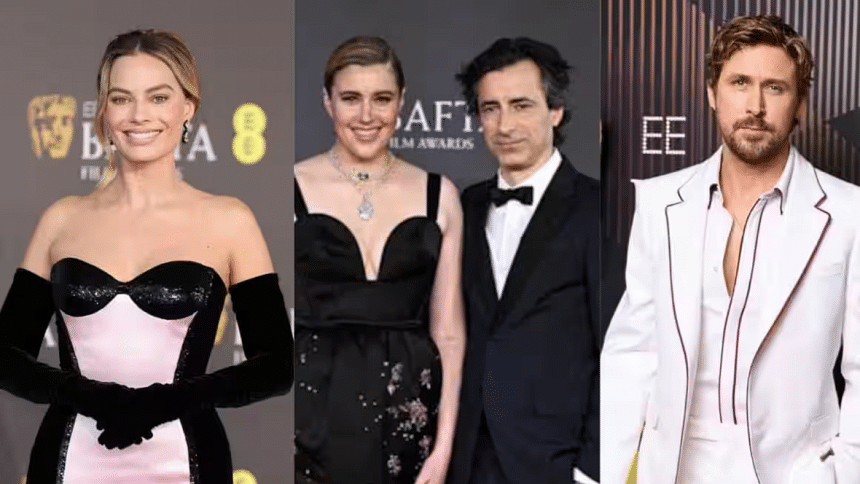BAFTAs 2024: ‘Barbie’ and ‘Killers Of The Flower Moon’ head home empty-handed

"Oppenheimer" dominated the BAFTA Film Awards on Sunday, securing Best Film, Best Director for its British-American creator Christopher Nolan, and Best Actor for Cillian Murphy. Meanwhile, Emma Stone triumphed with her performance in "Poor Things," while "Barbie," "Maestro," and "Killers of the Flower Moon" faced disappointment, being shut out weeks before the upcoming Oscars in Los Angeles.
"Barbie" director Greta Gerwig experienced a notable snub, failing to secure a directing nomination for both the BAFTAs and the Oscars, which was perceived by many as a major oversight. Meanwhile, the Gothic fantasia "Poor Things" claimed five prizes, and the Holocaust drama "The Zone of Interest" gained three wins.
British-born filmmaker Christopher Nolan secured his inaugural Best Director BAFTA for "Oppenheimer," while Irish performer Cillian Murphy clinched the Best Actor prize for his portrayal of physicist J. Robert Oppenheimer, the father of the atomic bomb. Murphy expressed gratitude for embodying such a "colossally knotty, complex character."
Oh boy! Cillian Murphy collects his Leading Actor BAFTA for Oppenheimer #EEBAFTAs pic.twitter.com/M5pjKhtrqZ
— BAFTA (@BAFTA) February 18, 2024
Nolan acknowledged the film's inherently nihilistic theme regarding nuclear weapons, thanking the movie's backers for embracing a dark subject.
Emma Stone earned the title of Best Actress for her portrayal of the wild and spirited Bella Baxter in "Poor Things," a steampunk-style visual extravaganza that secured prizes for visual effects, production design, makeup, hair, and costume design.
Despite Oppenheimer's field-leading 13 nominations, it fell short of the record of nine trophies set in 1971 by "Butch Cassidy and the Sundance Kid."
It triumphed in the Best Film category, surpassing contenders like "Poor Things," "Killers of the Flower Moon," "Anatomy of a Fall," and "The Holdovers." Additionally, Oppenheimer secured victories in editing, cinematography, and musical score. Robert Downey Jr., portraying Atomic Energy Commission head Lewis Strauss, also claimed the Best Supporting Actor prize.
Da'Vine Joy Randolph earned the title of Best Supporting Actress for her portrayal of a boarding school cook in "The Holdovers" and expressed a sense of "responsibility I don't take lightly" to share the stories of underrepresented individuals like her character Mary.
In a competitive year for cinema, Oppenheimer faced strong competition, energized by the conclusion of actors' and writers' strikes that had previously halted Hollywood for months.
"The Zone of Interest," a British-produced film shot in Poland with a predominantly German cast, achieved a unique feat by being named both Best British Film and Best Film Not in English — a first. The film also received recognition for its sound, described as the true star of the production.
Jonathan Glazer's unsettling drama unfolds in a family home located just outside the walls of the Auschwitz death camp, where the horrors are conveyed through sounds and subtle suggestions rather than explicit visuals.
"Walls aren't new from before or since the Holocaust, and it seems stark right now that we should care about innocent people being killed in Gaza, Yemen, Mariupol, or Israel," expressed producer James Wilson. "Thank you for recognizing a film that asks us to contemplate these spaces."
The Ukraine war documentary "20 Days in Mariupol," produced by The Associated Press and PBS Frontline, claimed the prize for Best Documentary.
"This is not about us," emphasized filmmaker Mstyslav Chernov, who, along with an AP team, depicted the harrowing reality of life in the besieged city. "This is about Ukraine, about the people of Mariupol."
Chernov described the story of the city and its descent into Russian occupation as "a symbol of struggle and faith. Thank you for empowering our voice, and let's just keep fighting."
The awards ceremony, presented by Doctor Who star David Tennant — who made a stylish entrance in a kilt and sequined top, accompanied by a dog named Bark Ruffalo — served as a glamorous, British-accented precursor to Hollywood's Academy Awards, closely observed for insights into potential winners at the Oscars on March 10.
The award for Original Screenplay was bestowed upon the French courtroom drama "Anatomy of a Fall." Director Justine Triet and her partner, Arthur Harari, crafted the film about a woman on trial for her husband's death.
"It's a fiction, and we are reasonably fine," Triet humorously remarked.
Cord Jefferson claimed the Adapted Screenplay prize for the satirical "American Fiction," delving into the challenges faced by an African-American novelist.
Jefferson expressed hope that the movie's success "maybe changes the minds of the people who are in charge of greenlighting films and TV shows, allowing them to be less risk-averse."
The British film academy implemented changes in 2020 to enhance diversity in the awards, responding to the absence of women among the best director nominees for the seventh consecutive year and an all-white lineup of 20 nominees in the lead and supporting performer categories. Despite these efforts, Justine Triet stood as the sole woman among the six best-director nominees this year.
The Rising Star award, the only category determined by public vote, was presented to Mia McKenna-Bruce, the star of "How to Have Sex."
Prior to the ceremony, nominees, including Bradley Cooper, Carey Mulligan, Emily Blunt, Rosamund Pike, Ryan Gosling, and Ayo Edebiri, graced the red carpet at London's Royal Festival Hall. Presenters Andrew Scott, Cate Blanchett, Idris Elba, and David Beckham also made notable appearances.
The guest of honor was Prince William, fulfilling his role as the president of the British Academy of Film and Television Arts. Notably, he attended without his wife, Kate, who is currently recuperating from abdominal surgery last month.
The ceremony featured musical performances by Hannah Waddingham, star of "Ted Lasso," enchanting the audience with "Time After Time." Sophie Ellis-Bextor also graced the stage, delivering her 2001 hit "Murder on the Dancefloor," which experienced a resurgence on the charts after being featured in "Saltburn."
Film curator June Givanni, the creator of the June Givanni PanAfrican Cinema Archive, was recognized for her exceptional British contribution to cinema. Actress Samantha Morton was bestowed with the prestigious BAFTA Fellowship, the academy's highest honour.
Morton, who spent her formative years in foster care and children's homes, emphasized the importance of representation, stating, "The stories we tell have the power to change people's lives. Film changed mylife, it transformed me, and it led me here today."

 For all latest news, follow The Daily Star's Google News channel.
For all latest news, follow The Daily Star's Google News channel. 









Comments